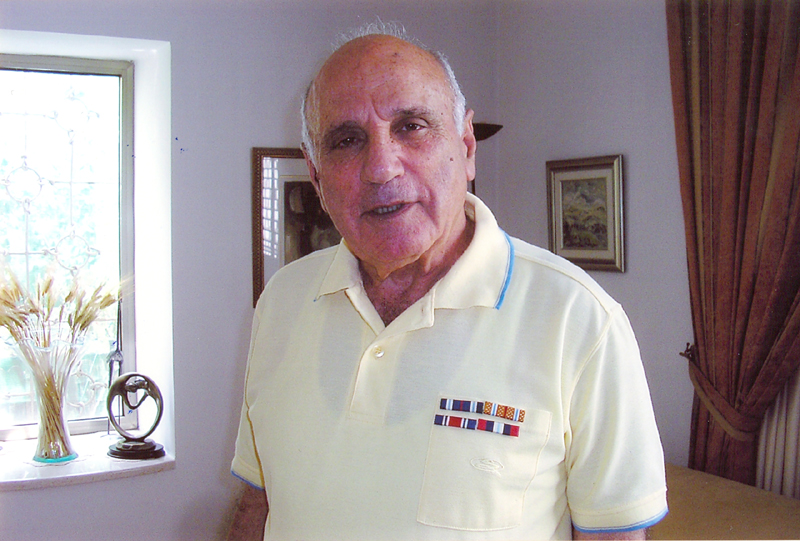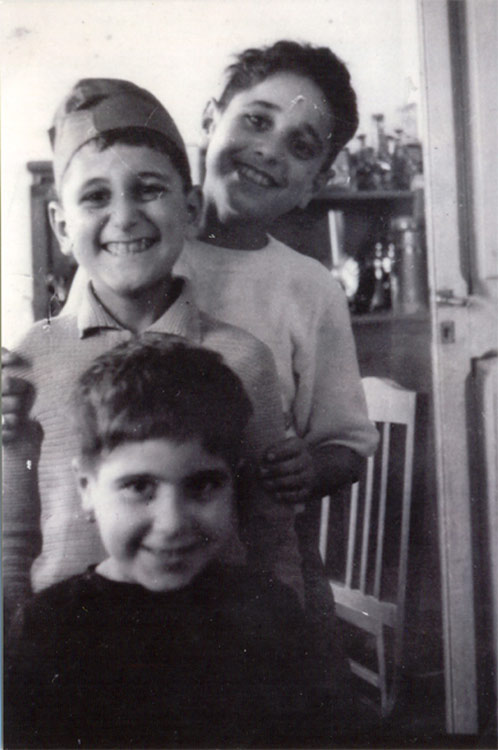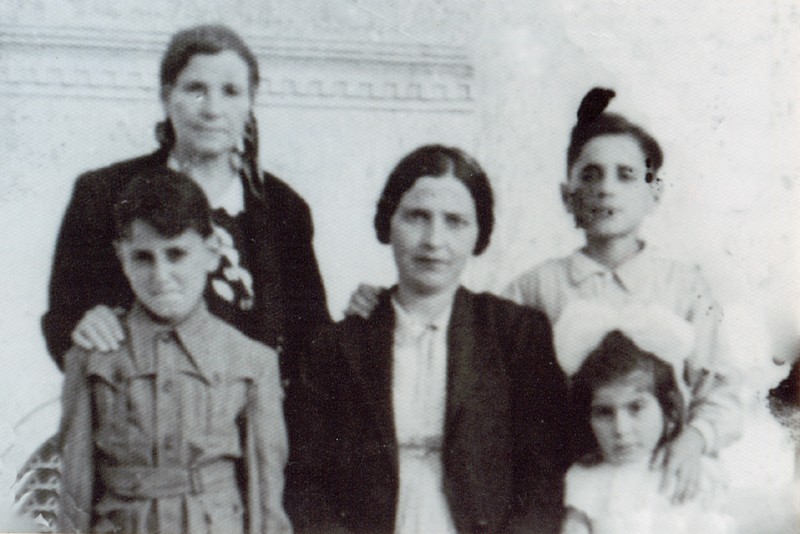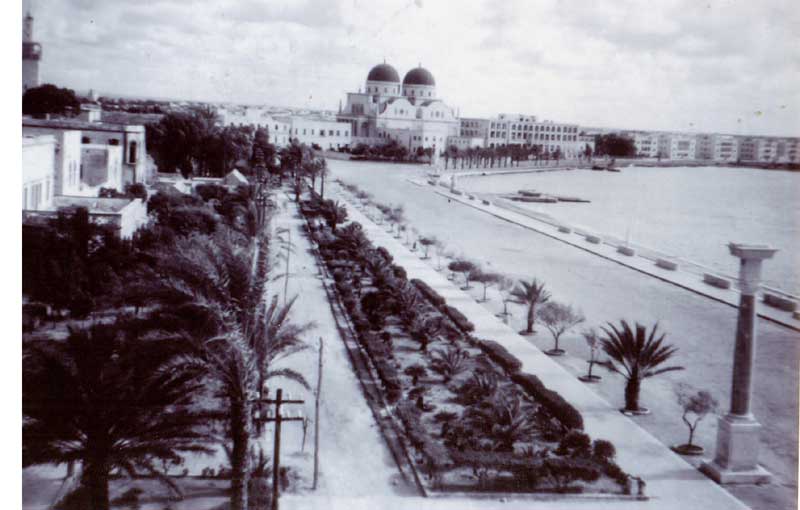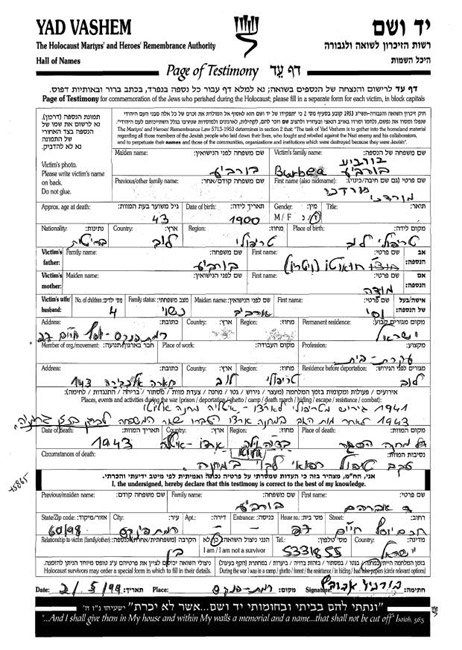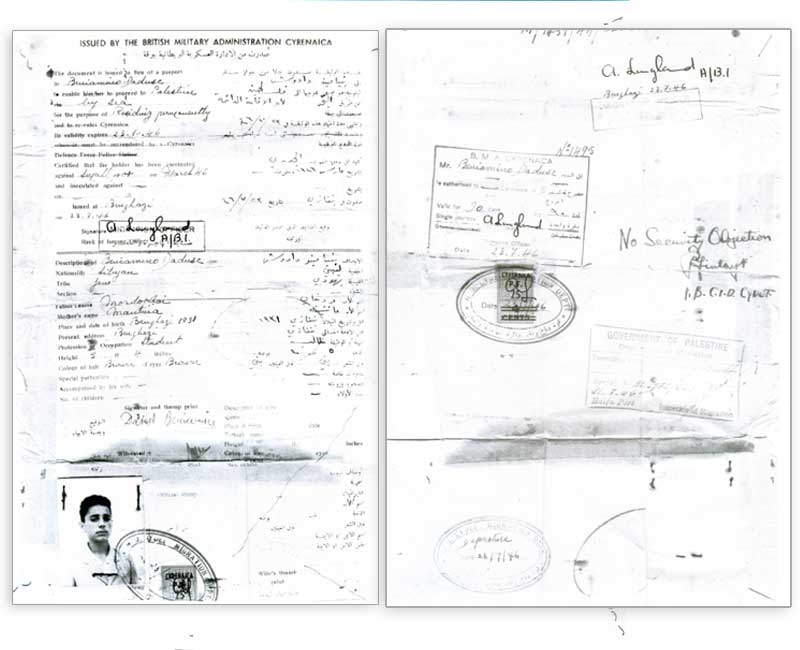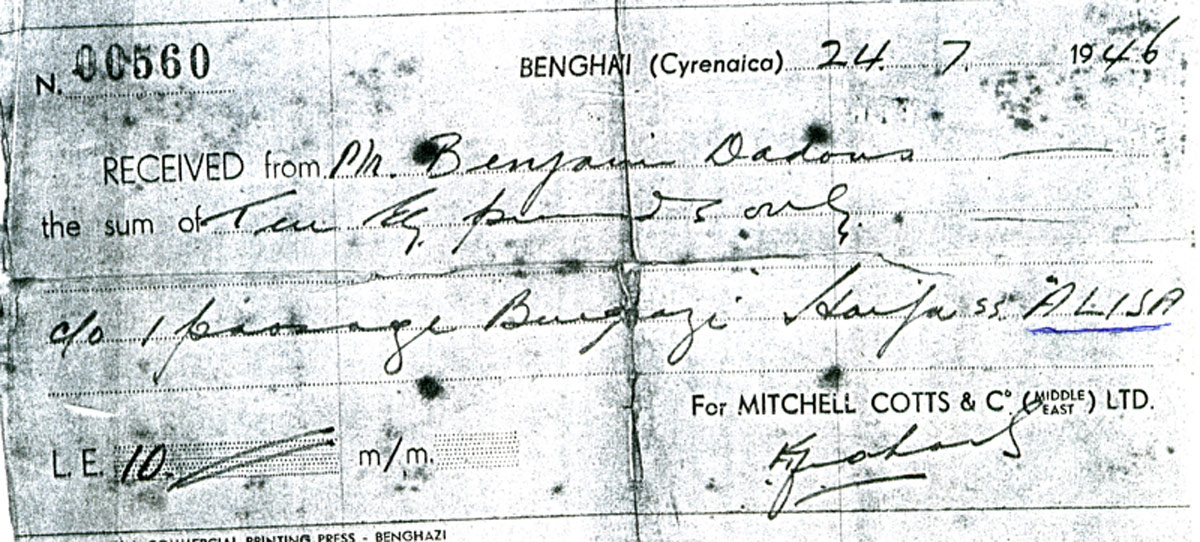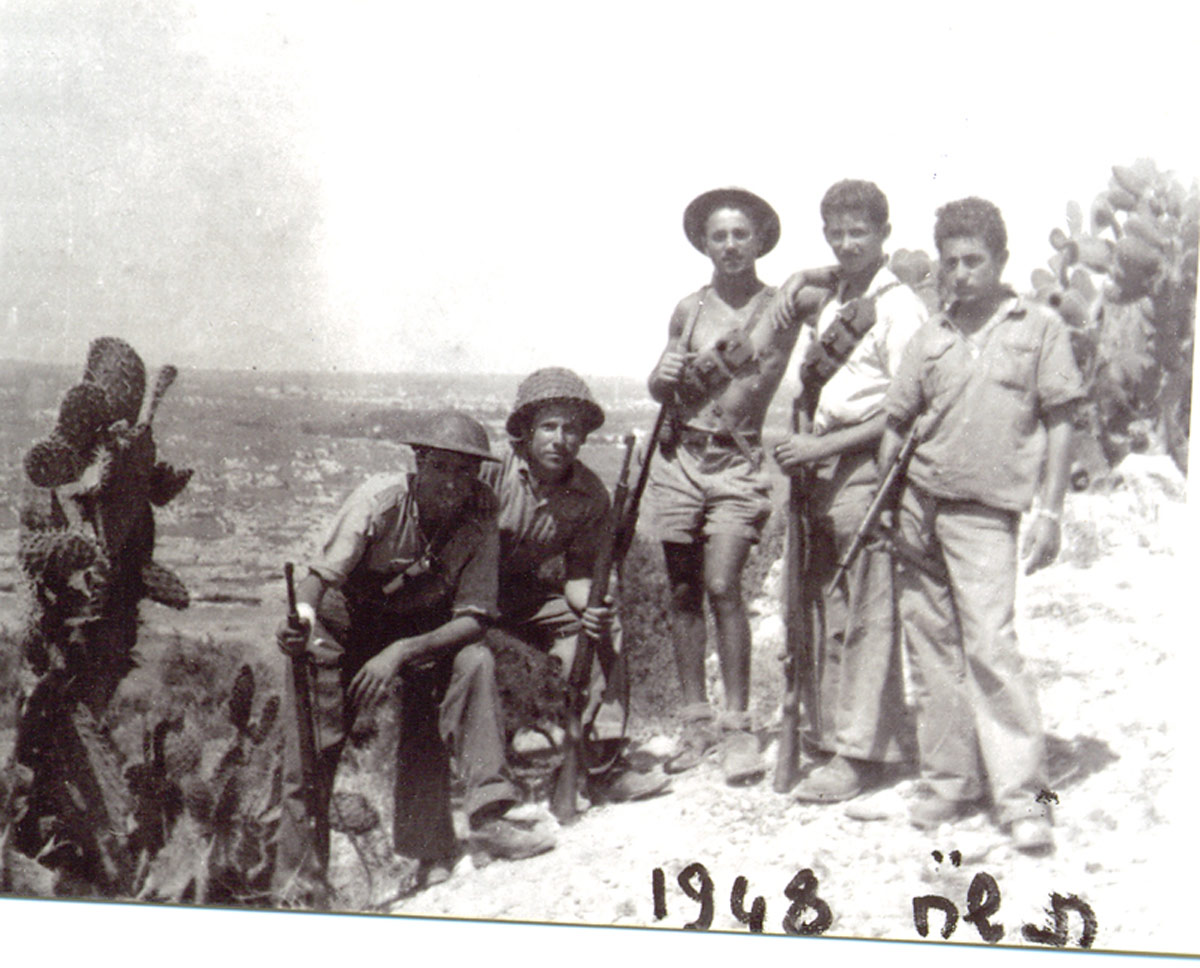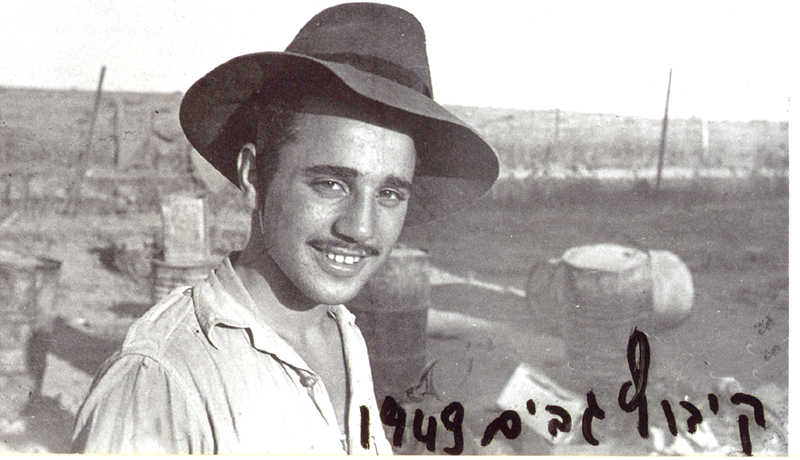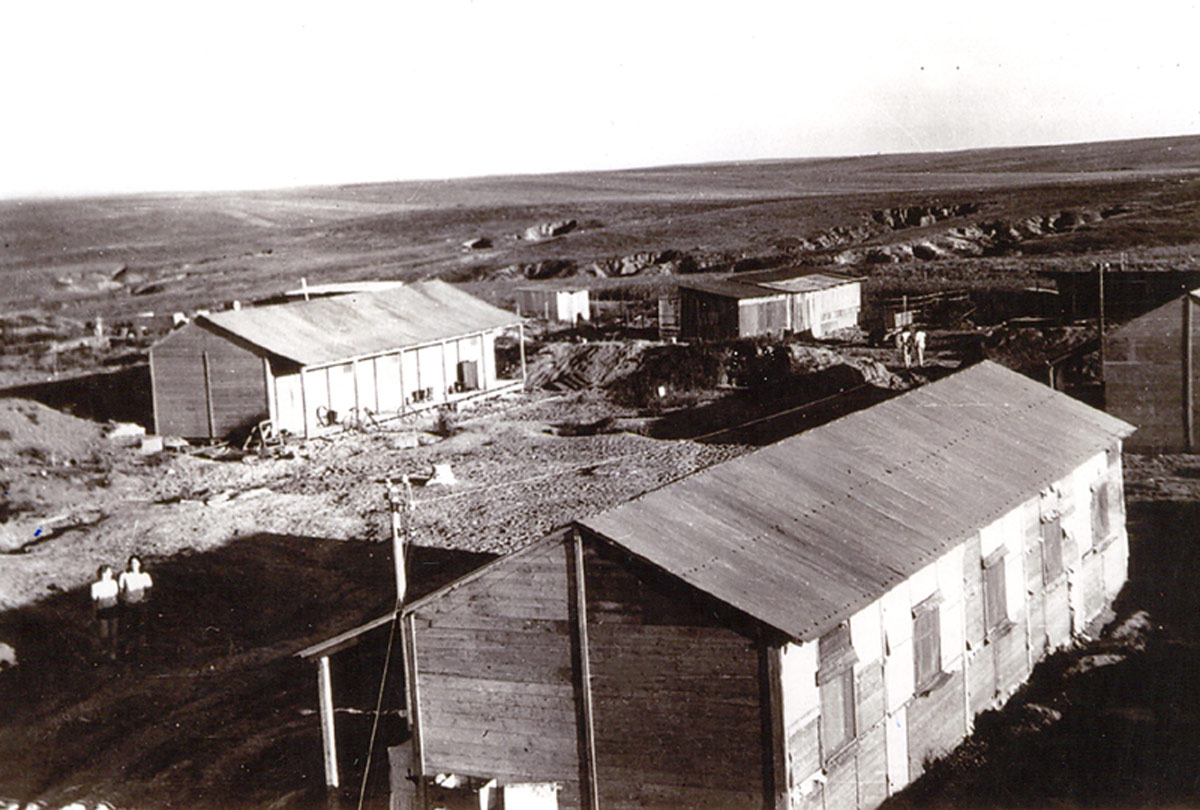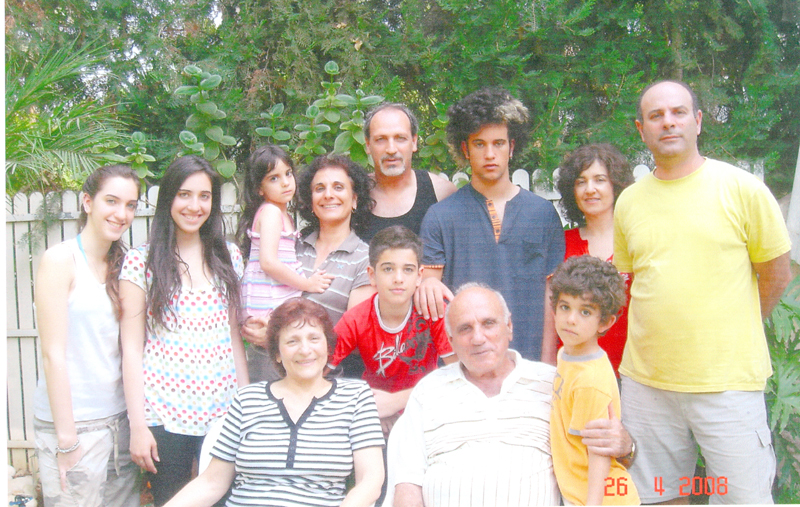Historical overview: Libya during World War II
From 1911-1943, Libya was under Italian control. In September 1938 the Italian government issued racial laws, similar to Germany’s Nuremberg Laws, and they were applied to the Jews of Libya in 1940. This was the start of the deterioration of the Jews’ situation.
British, Italian, and German troops vied for dominance in the region, and their seesaw battles for Libya also affected the Jews. In 1942, thousands of Libyan Jews were sent to concentration and labor camps in Libya. More details of the fate of the Libyan Jews can be found in “The Jews of Libya”, in this newsletter.
With this background, we present excerpts from an interview recorded with Benjamin Doron, born 1931 in Benghazi, Libya
Life in pre-war Benghazi
My name is Benjamin Doron. My father’s name was Morchai or Mordechai Dadosh.
My mother’s name was Diamantina; her nickname was Mantina.
Let me tell you about my grandmother, who played a central role in my childhood. Her name was Henriquette or Regita Arbib (Nadjari). She was my mother’s mother. She was born in Saloniki, and from there she went to Alexandria in Egypt to visit her brothers.
She met my grandfather who was there on business. Later they married and came back to live in Benghazi.
I feel more connected to the name I adopted when I came to Israel after the War of Independence, which is Doron. When I was living with my parents, my name was Dadosh.
Father was a worker at the port of Benghazi. He worked there until the first occupation of the British. We weren’t rich, but we were not poor either. My mother was a housewife. We were three children, my brother Amos, my sister Rachel and I. I was the eldest.
My grandmother lived in the Eastern part of the city, which bordered on the Muslim quarter, and we lived in the Italian quarter of Benghazi, on the third floor of an apartment building. Our toilets were inside the building, but where Grandmother lived, the buildings were older - from Turkish times - and all the facilities were outside. She lived there with her son, Herzl, my uncle, who was 17. She had to work to make a living to look after herself and her unmarried son. She ironed shirts. Most of the Jews lived in the new city and a few from the older generation lived in the old part where my grandmother lived. There was no Jewish ghetto. Grandmother had Jewish and non-Jewish friends. Some of her friends came from Greece, and Malta. In the synagogue everyone was the same. There were four synagogues and everyone prayed in the Sephardic tradition.
School
The Jewish children went to the Italian Jewish school, where there were three classes. Some non-Jewish Italian-speaking pupils also went to our school. I started to go to school when I was 7, but at the age of ten and a half, the Second World War started and the school closed. I don’t recall or know of any specific anti-Semitic incidents at school. After school some of the children went to learn limudei kodesh (religious studies), at the Talmud Torah. I went at the beginning, but discontinued later, I don’t really know why.
Part of our curriculum in January, February and March 1940, was to learn about fascism! We even wore the black or grey uniform of the Fascist Youth movement and sang Fascist songs. I remember when Mussolini visited Benghazi in 1935. He arrived in the main square on his horse and met with officials.
Our community
In the community there were religious leaders who took care of chevra kadisha, (burying the dead), the synagogue, religious education, circumcision etc., and the rest of the community who were traditional but not ultra-orthodox. We were liberal Jews. We almost never drove on Shabbat, but this was because we didn’t own a car! We went by foot to the cinema on Shabbat. We bought tickets on a Friday, or paid on the Sunday after. All the Jewish shops were closed before Shabbat on Friday and on Shabbat. However, we were traditional and kept a strictly kosher household. A month before Pesach we began to prepare the wheat for the matzot. All our rooms were cleaned out and we weren’t allowed to go into them. A week before the Rabbi would go to the bakery and make sure that everything was in order for baking the matzot. Grandmother would prepare the dough for the matzot and it would be taken to be baked in the communal oven.
Everyone went to synagogue on Friday evening or Shabbat. On Friday afternoon, the Chief Rabbi would bless the owners of the Jewish shops and wish them Shabbat Shalom, as they stood outside waiting for him to pass.
The Jews of Benghazi were represented by the Chief Rabbinate and also the Jewish community council who worked together. There were about 3,000 Jews in Benghazi at this time.
After 1938, with the advent of the Racial Laws, all Jewish-owned shops and our school had to be open on Shabbat. The Chief Rabbi told us not to go to school and we asked non-Jewish people to open the Jewish-owned shops on Shabbat.
During WWII
My last school report was from April 1940 and this was the end of our schooling and the beginning of the trouble. Regular schooling for all children in Benghazi ended in April.
The first British occupation began at the end of 1940 but life continued more or less normally. There were no changes in the daily family routine. Receiving the British army was a cause for rejoicing. As children, we use to get small additions in food like jam, and bread but we weren’t hungry at this point. There were a lot of bombings, and my uncles had no work.
Now according to grandmother’s story, the British authorities tracked my father down as someone who had worked in the port and since they wanted to operate the port, they got him to get things moving in the port for them. He got the other workers to report for work. Boats began to dock and nothing was missing at home. My uncles, who were tailors, had a more difficult time since they were not receiving many orders, but I don’t think that they were missing the basic commodities.
We lived on the third floor of a long block of flats with four or five entrances, and when there were bombings we went down to the shelters. One could run across the roof of the whole long building and descend to the street from the last steps in the building, but more of that later in the war.
In the spring of 1941, the Afrika Korps (German expeditionary force), led by General Rommel, arrived and pushed the British army out, ending the first British occupation. There were some Italian soldiers attached to Rommel’s army as well. This was the beginning of a much harder period for us. Firstly someone informed on my father to the Italian judicial authority as having collaborated with the British in helping to open the port for their use. He was tried in an Italian court and sentenced to twelve years imprisonment for aiding the enemy. During this entire period it was impossible for us to see him or visit him.
When the Germans entered the city, it resulted in looting and hooligan behavior on the part of the Italians against Jewish shops and I remember this clearly. I saw it from the windows of the flat on the third floor - Italians rampaging down in the streets.
We never saw father again until after the war. He was never prepared to talk about this period. He did tell my brother that he suffered during this period and he saw difficult things but he never elaborated on this general statement. He was taken to Tripoli and from there transferred to Italy on a troop carrier, and jailed there.
Our mother fell ill with typhus and died and we remained with our grandmother who looked after us as orphans. She moved into our apartment with Herzl our uncle, because it was on the third floor and therefore safer than the ground floor where she lived. We would use the water hole that she had in her courtyard because of water shortages, and it became my responsibility to walk to her home to fetch water for use in our flat. Life became harder, the city was very dirty and lice became a problem to be dealt with. Food wasn’t as plentiful as before but I don’t remember actually feeling starved. You could get basic foodstuffs. We stayed at home most of the time and the only time I went out of the house was to fetch water and to go to synagogue on Friday night and Saturday morning.
Grandmother sold off her private jewelry from time to time in order to support us, and it appears that this was sufficient for us to buy food.
You must remember that there were also aerial bombardments so we did not move around a lot. When there were bombings at night, and it was too dark to go out, and there were no alarms to warn us of the incoming bombs, I remember that my grandmother would tell us to each stand in a corner, and to say “Shema Yisrael”1, and to just wait. It was war for us, meaning limited movement, some hardships, fear but nothing unbearable. The Jews remained within their community and didn’t experience anything really bad at this stage except for the racial laws.
At the end of 1941, beginning of 1942, the British pushed the Germans out and we received the British army again with rejoicing. However this period didn’t last too long. During this period we met some soldiers from Palestine who were serving in the British Army, but not many.
Again in 1942, the Germans returned for the second time and Mussolini ordered the Jews to be expelled from certain areas in Libya, and they had to congregate in Benghazi. The German governor together with the Italian governor demanded the creation of lists of all the Jews in Benghazi that the Rabbi and the community leaders refused to supply. We didn‘t know where they were being sent. And then a Jew called Docha made the lists for the Germans and these lists were posted in the synagogue. The Jews listed had to appear at a certain meeting point on a certain date, from which they were taken away in trucks.
We knew nothing about the fate of the Jews elsewhere although at this time, some Jewish refugees from Europe arrived in Benghazi and the Jewish community helped them with the basics, such as bread, beans and water from the well etc., but shortly afterwards they were sent back to Europe and I don’t know what happened to them.
So every few weeks, a few trucks with Jews were loaded up and taken away and we didn’t know to where. For some reason, we were at the end of the list, although some of my uncles from my father’s side were trucked out in the first convoy.
Slowly Benghazi became a ghost city with only about 250 Jews left. This was a very difficult period because the city had emptied out and it was very difficult to find provisions. Non-Jewish French and British citizens began to leave and return to their countries, and Jews of French nationality first went to Tripoli and were sent to Tunisia and those of British nationality were sent to Italy and from there some were sent to Bergen Belsen.
At this point we began to suffer from starvation. I became responsible for gathering food, even from the German army, like remains of jam from tins, but it wasn’t enough.
Most of the houses and shops belonging to Jews had been broken into. Grandmother then had an idea that I should go into broken-down houses and look for food, which I began to do, and I succeeded in finding enough food to keep us afloat: beans, tomatoes etc.
Only once do I remember that German soldiers shooed me away from near their head- quarters.
Even body ablutions, I was responsible for emptying out the buckets, cleaning and bringing water back from Grandma’s well near the sea. I was the only one who left the house of the five of us. Twice a day, morning and night I did this
One day, around August or September, we finally had to leave on one of the trucks. Grandma prepared a load for each one to carry – a little food, blankets. When we reached the main road to Tripoli, a German roadblock stopped us and returned us to the city. We were told to get off the trucks and we headed for Grandma’s house near the sea. When we got there, her Arab neighbor said it was better for us to stay only one night and to leave the area of the city for a certain village further out, probably because of the aerial bombings. He had already sent his own family there. So the next day we started out and my sister and I remember resting and sleeping in the Jewish cemetery on the way out of the city. By evening after walking the whole day, we arrived in the small village made up of mud huts with all the activity centered around the watering well. The Arab neighbor accompanied us to the village since his own family was there and we remained there until the end of the war. We were given a small single room wooden hut and subsisted on the basics that the Arab neighbor would bring to Grandma every so often, such as bread, beans, water from the well. As before, her manner of paying for his keeping us alive was with a piece of her jewelry from time to time.
We were the only Jewish family in the vicinity and were under his protection, until the beginning of 1943 when Grandma told us to gather our belongings, and we returned to Benghazi to both houses, which had been broken into.
Life after WWII
The British army was now back with soldiers from India and New Zealand and they were generous in what they gave us to eat, to keep us alive, such as jam, yellow cheese, and tea. We settled into the third floor flat.
My uncle, who was seven years older than me, took over the reins.
This is where the soldiers from the "Jewish Brigade" of the British army arrived, speaking Hebrew and looking for the Jews. The Jewish soldiers guarded us, giving us food, and they organized a school for us, one class with forty, or fifty kids until the remnants of the Jado (Giado) camp2 started returning. And then they started opening extra classes. You have to imagine that what days before had been a ghost town was now transformed under the British influence and especially the Jewish soldiers into a different reality with education restarting, books, pencils, blackboards and everything being held in Hebrew. The school was called a Talmud Torah and this way the British had no problem in allowing ‘religious instruction’. They were all in soldiers’ garb and amongst other things were teaching Zionist ideas with songs. I remember the stamps of the Keren Kayemet with pictures of Ein Harod and other kibbutzim and clearly this was part of imparting ideas about Israel. We began to speak in Hebrew, and I spoke Hebrew with my brother, and learned arithmetic in Hebrew. Some of the soldiers remained illegally to continue teaching us but a young man called Skolnick had started training local people to take over the brunt of the educational endeavor.
There was also the phenomenon of fictitious marriages between soldiers and local girls so that they could enter Palestine ‘legally’ and some local youths who were even dressed in British uniforms with the army ‘pass’ of Jewish soldiers who remained behind in Benghazi. Some of the Jewish soldiers met and married Jewish girls from Benghazi.
One of my uncles, my father’s brother, named Benjamin Dadosh, was the second Jew to die in the Jado Camp. My uncles told me that people died there from starvation and disease. There wasn’t a family who didn’t have someone who had died in the camp.
Emigrating to Palestine
In 1946, five entry certificates arrived from Palestine to school in Libya. I was one of the students given a certificate. I still have a copy of it. I don’t know if there was a draw, or how I got one, but they said they took good students from the higher classes. Around the same time, a boat containing cows arrived from Palestine. The boat was called “Aliza”.
In 1946, I sailed to Palestine on the Aliza, with the cows, and began my new life. The five of us from Benghazi went to the Youth Village in Ben Shemen. The other people there looked at us strangely as they had never seen Jews from North Africa before. All the staff came from Germany, and they didn't know who we were, and didn't know how to look after us. Soon they saw we were polite, and we spoke Hebrew. They decided to send us immediately to agricultural school and integrate us as soon as possible. We didn't know anything about physics or chemistry, but after three months, we sat and learned everything: physics, chemistry, mathematics. We had a problem with music, especially classical music, as we hadn't heard music for three years, all throughout the war. We also didn’t know anything about art; we had never heard that pictures could “speak” to you.
Boarding the boat with my luggage and certificate to Palestine was one of the hardest things for me because I had to leave my Grandmother and siblings behind. I didn’t worry about them, though, because they were now making a good living, and eventually my uncle owned the largest store in Benghazi.
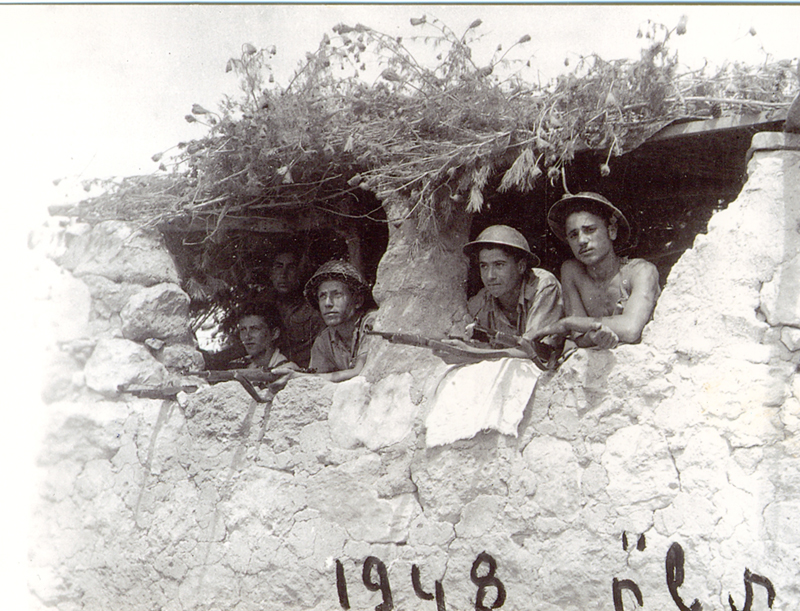
Hativat “Yiftach” (Yiftach Brigade) of the Palmach during the Israeli War of Independence, 1948. Benjamin is on the far right.
Building a new life
At the age of 16, Benjamin served in the pre-State Palmach, defending Ben Shemen with a group of about 200 other young men and women. He was part of Hativat Yiftah and took part in Operation Danny3. Later, as a soldier in the Israeli army, he took part in the War of Independence, the War of Attrition, the Six-Day War, and the Yom Kippur War.
Benjamin’s grandmother, along with his brother and sister, arrived in Israel at the end of 1949. Benjamin saw to it that his brother and sister were made part of the Youth Aliya and taken to kibbutzim, where they were well-treated. Benjamin’s father also arrived in Israel at the same time, together with a new wife and a baby. The years they had been apart took their toll; Benjamin had not seen his father since 1941.
Benjamin married Sara, and had a son Gil, who is married to Nadine, and a daughter Sarit, who is married to Kobi. He also has six grandchildren.
He took a course in economics and began working for the largest pension company in Israel – Mivtachim – as a clerk, opening envelopes. By the time of his retirement, forty years later, he was the General Manager of the company.
Message from Benjamin Dadosh
My message to students is to go and learn about what happened to Jews in North Africa. Much has been written about it in many languages. Please go and learn that it happened to us, too. Our fate was linked to the Jews of Italy. It was just a question of time and it was our luck that the war in Libya ended before the war in Europe.
- 1.The Shema is an affirmation of Judaism and a declaration of faith in one God. Traditionally, this prayer is said by Jews who know they are about to die.
- 2.The Jado concentration camp in Libya was established in February 1942. More than 500 Libyan Jews died there as a result of the terrible conditions. For more details, see the article “The Jews of Libya”.
- 3.Operation Danny was an Israeli military offensive launched at the end of the first truce of the Israeli War of Independence, from July 9-19, 1948. The objectives were to capture territory east of Tel Aviv and then to push inland and relieve the population and forces in Jerusalem. The operation was named after Danny Mass, , the commander of the "Convoy of 35", 35 soldiers who had been killed trying to reinforce four blockaded collective settlements (kibbutzim) in the Etzion bloc. The operation commander was Yigal Allon and his deputy was Yitzchak Rabin. The total force numbered around 6,000 men.

